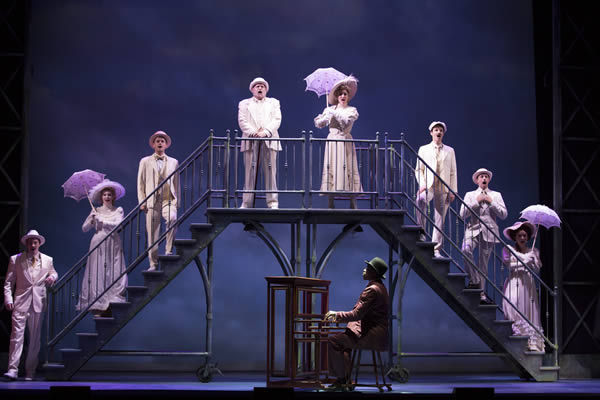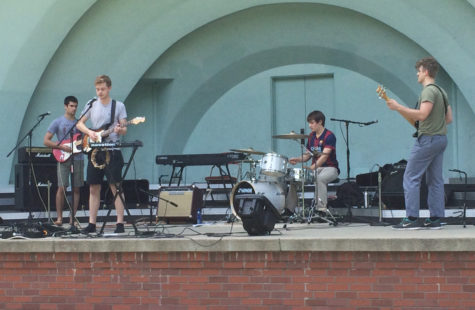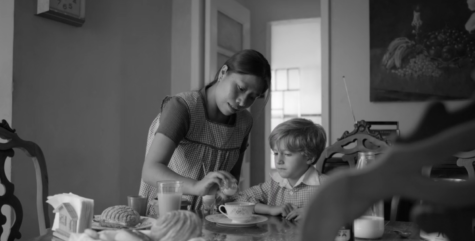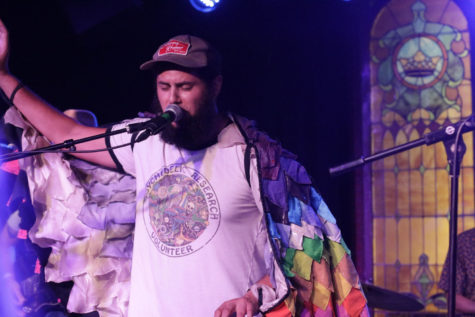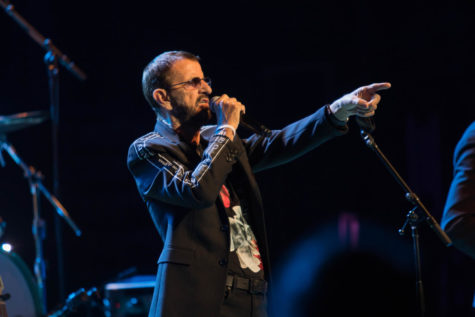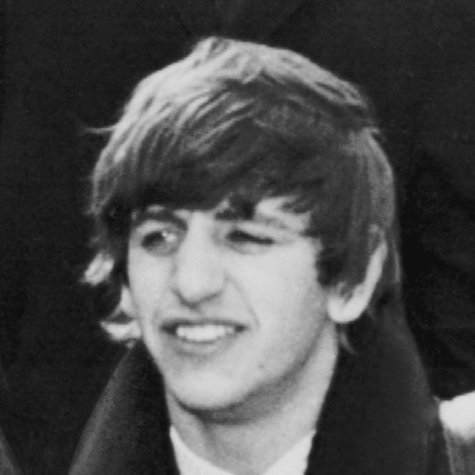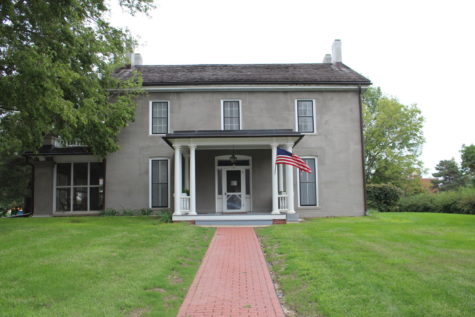Theatre Review: Ragtime still relevant
February 18, 2016
A screen of puffy, building clouds over blue sky hid the stage as the audience filled the lower level of Stephens Auditorium on Thursday night. An experienced Iowan would tell you that those clouds meant a storm was brewing somewhere, an ominous description for the plot of “Ragtime: the Musical.”
Prior to the show, Stan Rabe spoke in the Celebrity Café. Rabe had seen the original production on Broadway three times, and spoke of its luxury in plot and orchestration. The audience in the café were not familiar with the book. He explained the historical importance of both the fictional and historical figures in the production, which audience members found beneficial to understanding the complex narrative.
Act I
The screen lifted to reveal two staircases set end to end. The staircases acted as the majority of the set, creating balconies, levels, and the rails of a ship.
The three main social groups in “Ragtime” were represented: the wealthy white people on the stairs, above everyone else and facing the audience, the African Americans in a line down one side, the immigrants facing them down the other. A gentleman in a copper colored suit played piano centerstage.
The Little Boy left the adults on the stairs to curiously approach the piano, then came forward to address the audience. “In 1902, Father built a house,” he began.
The first act is long, and feels as if a continual introduction. Each character is presented and their plots started, but thinks seem to move slowly in the world of explanation, not action.
Mother (Kate Turner) introduces the house as her domain, but her husband leaves with a prominent explorer soon after the show begins. Her frequently cowering Younger Brother (Donald Coggin) lives with her, her son, and his Grandfather (Bob Marcus). Grandfather’s grumpy comments routinely got laughs.
The three groups are separated by costume and choreography. The upperclass in white, with women carrying parasols and wearing large hats; the African Americans in warm colors with smaller hats; the immigrants in grey and black with caps for the men and scarves over the heads of the women.
Their dances were choreographed to the cultures they represented. The white upperclass moved very little, remaining poised, stiff and formal. The African Americans used jazz hands and kicks. The immigrants danced in circles with hands above their heads and arms bent at right angles, recognizable as eastern-european Jewish dances.
When Father (Troy Bruchwalski) leaves he is initially gruff, but apologizes and attempts to show he cares by giving her last-minute instructions like “cancel the tickets to the Philharmonic.” His last words are “God bless America.” Father and Mother would not be considered romantics.
Mother reveals she has an adventurous heart in “Goodbye My Love” and longs for a journey of her own. Father, aboard the ship, upholds the them begun in the beginning of the show that the upperclass do not see the other two groups, ignoring the handshake of the African American first admiral. He does notice the immigrant ship arriving, however.
Tateh (Matthew Curiano), an immigrant aboard the ship, calls Father a fool for leaving America, but tries to empathize with why he would. Tateh looks for a commonality between the two men, while Father takes a patronizing view, singing “A salute to the immigrant stranger. Heaven knows why you’d make such a terrible trip. May your own god protect you from danger.”
Father’s comments on the immigrants could be termed ignorant, referring to their “guttural language.” Throughout the musical, Father would hold and represent the values of the white upperclass.
Younger Brother, representing the younger generation of the upperclass, introduces the audience to Evelyn Nesbit (Jillian Van Niel) and personifies America’s obsession with the spectacle she created as “the girl on the velvet swing.”
The “trial of the century” in which her husband shot her lover was portrayed in a vaudeville act, with the lover, architect Stanford White, in cupid costume. Her husband, Henry K. Thaw, wore a checkered suit with arms that stretched to wrap around in a straightjacket. The men were portrayed as buffoons, and Nesbit swung in a feathered headdress and relatively little clothing, giving off signature squeals.
After establishing the state of society in the early 1900s, the musical shifts into following three separate story lines: Mother, Tateh, and Coalhouse Walker, Jr. as each experiences something to change their world view.
Grandfather and The Little Boy are listening to Nesbit on the radio and dancing in a way so as to make fun of her. Mother scolds her son and explains that Nesbit has “strayed from the path everyone wants to be on, if only they could.” She seems slightly bitter, and you get the sense Mother does not enjoy the path.
The Little Boy quotes his father that life isn’t hard for women, and that “men are tested everyday.” Mother stops working in the flowers to correct him, then asks her son to read a letter from Father. The letter has barely been opened when Mother screams – there is a newborn baby buried in the garden. The baby is African American.
Mother panics in her first real moment to be in charge, upset that Father is not there to handle everything for her and that his instructions left in “lists, lists, lists” are no help.
It was also an eye opening moment for her. Although Mother is more aware than Father, she admits her own ignorance. “Each day, the maids trudge up the hill… I never stopped to think they might have lives beyond our lives.”
An Irish police officer brings the mother of the baby, Sarah, her head bowed to hide her face. He offers to take the baby and the mother to an institution, but Mother takes both into her home.
The show goes to New York City, where Tateh established himself selling silhouettes cut from paper. “They gave me a name I cannot pronounce,” he quips. “Call me Tateh.”
One thing he wants above all is to create opportunities in America for his daughter. Historically successful Americans such as J.P. Morgan and Houdini act as inspiration.
Tateh grows discouraged as his daughter becomes ill, wrapping her in his prayer shawl and regretting their move. A man offers money for his daughter, and Tateh attacks him. When police officer separates them, he spits at Tateh, saying “you people.”
The African Americans bring the energy to the show through choreography and their music, the music of ragtime. Coalhouse Walker, Jr. is playing the piano in a club. Couples again dance around the piano, teasing him for constantly mentioning Sarah, a woman he loved and lost – and the woman who gave birth to the child Mother found, although Coalhouse does not know this. All he knows is an address to find her.
Coalhouse goes to purchase a car from Henry Ford to woo Sarah. Workers punch in onstage, wearing light blue aprons. “Even people who ain’t too clever can learn to tighten a nut forever, attach one pedal or pull one lever,” Ford sings as the workers pass wheels down the assembly line. Immigrants were the primary group of people Ford was referring to, building the industrialization of America on their labor.
The scenery and general picture on stage was simple but effective, in bold, clear colors throughout the show. The piano and car were bare outlines of their full selves. The piano was made primarily of copper colored piping, the car of similar piping in red. The fast paced music of ragtime fit well with the atmosphere of a factory.
The musical begins to bring the three groups together, including the stories of Mother, Tateh, and Coalhouse.
The bare stage following the high energy of the factory leaves the audience with a sense of stillness and expectation. Mother, not more comfortable as head of the household, takes the Little Boy to check on Father’s fireworks business. Her son says, “Father says a woman’s place is in the home.” Mother’s reply? “Then he should have stayed home.”
On the same train platform are Tateh and his daughter, leaving New York City for anywhere better. His daughter has a rope around her, tied to Tateh. Both Tateh and Mother have learned a valuable lesson in the recent events of their lives and are journeying out of where they thought they should be.
Both parents scold their children not to stare. Tateh greets Mother, and the Little Boy quickly tells Tateh and his daughter all of the family secrets, including Sarah and the baby. The Little Girl does as she was taught and withholds all information. The parents commiserate about children, forming an adorable companionship.
It lit a happy little fire in my soul, the first genuinely sweet moment in the musical. Following the high energy of Coalhouse preparing for courtship and establishing himself as a wealthy jazz musician, the nakedness of the stage allows Mother and Tateh to show their true selves and establish a pure relationship in the eyes of the audience.
Coalhouse stops for directions at an Irish firehouse on his way to see Sarah. The chief harshly calls him “nigger” to provoke him. You could feel the audience, charmed by Tateh and Mother’s friendship, chilled by the Irishman. After Coalhouse leaves, the firefighters agree to teach him a lesson if he returns.
Sarah is cradling the baby in the garden, singing a lullaby about the baby’s father. The lullaby turns from comforting to apologetic and then heartbreaking as she recalls the moment when she “buried her heart in the ground” (the baby). Jackson’s voice gave me chills, belting her pain, head bent to the stage and getting the hardiest round of applause yet from the audience.
Mother takes the child from Sarah and sends her to rest when Coalhouse arrives looking for Sarah. The Little Boy, called Edgar by his mother, is told not to let Coalhouse in. The Little Boy is the only member of the white family to have a name, adding credibility to the idea he is the true narrator.
Little Boy immediately opens the door, inviting Coalhouse in while telling him everything, talking fast in that way children do. “That’s Sarah’s baby,” he says, pointing at the bassinet. The audience laughs as the Little Boy fails to notice a dumbstruck Coalhouse. “Want a cookie?” he asks.
Sarah refuses to see him. Coalhouse returns each Sunday, bringing flowers for Sarah and a rattle for the baby. Eventually he stays to visit with the family, playing their piano. Miscellaneous members of the cast watch from the wings as the two groups, formally separated, now interact.
The first time Coalhouse stays, Grandfather asks if he knows any “coon songs”. Coalhouse corrects him, kindly but firmly, that coon songs are performed by white men in blackface during minstrel shows. Instead, Coalhouse plays ragtime. Mother is almost always holding the baby.
Months pass, and Father returns from his trip covered in hair. The new Irish nursemaid screams at the sight. Father remarks that Little Boy is no longer in short pants (a.k.a. has grown up) and Mother laughs that she hopes it’s him under all the hair or she’ll be kissing a stranger. After a quick peck on the cheek she begins catching Father up on the business, remarking that he should think about paying her because it is doing so well.
Father is obviously ignoring all of this, focusing instead on the strange African American baby his wife is cradling. The audience laughed loudly at Mother’s obliviousness. After Mother explains the child, Father pronounces it a bastard. Mother’s exuberance dies immediately. “That was an unkind remark,” she replies, walking away from him. “I did not expect a different man to come back, but a kinder one. I’ll see about your bath.”
Mother is still acting as his wife and fulfilling her role, but she has also become much more independent. She is influenced by Coalhouse’s courtship of Sarah and Sarah’s determination not to give in to him. “New Music” has Mother and Father questioning what the courtship has done to their view of a happy marriage.
Father sings that this new type of love has created a new music, but it’s a song he doesn’t know how to sing. Bruchwalski’s operatic training was clear in his singing, emphasizing the ties Father had to the old society and the contrast between himself and the new world around him.
Sarah finally agrees to see Coalhouse, and he swings her in circles exuberantly. Their ease and comfort juxtaposes well with the now strained marriage of Mother and Father. Sarah teases Coalhouse openly about how often he polishes his car. They take a picnic with their son, in “Wheels of a Dream” sharing the hopes they have for their son and their future.
A song that triumphant, happy and perfect in the middle of a show spells doom for the singers. At this point in the musical each group faces trials to test this new society that is forming. Mother, Tateh and Coalhouse all are forced to question whether they have made the right choice.
Emma Goldman leads the unions in a strike at the factory Tateh and his daughter now work in. Her speech ignites a spark in Younger Brother, who describes himself as “a firework, unexploded.” He finds a new purpose in the rally, transferring his obsession with Nesbit into a passion for equality.
When the strike turns violent with militia, Younger Brother urges Tateh and the Little Girl to take a train and leave for their safety. Tateh distracts his daughter with a book of silhouettes that appear to move when you flip them.
They go to Philadelphia, where a man buys the book for a dollar. Tateh calls them movies.
Coalhouse is stopped in his car by the firefighters. The police refuse to help, and his car is destroyed. Booker T. Washington speaks over the destruction, his sermon of earning the respect of white people contradicted by the hate crimes occurring onstage.
Coalhouse wants justice, but the bureaucracy refuses to cooperate. Even African American lawyers turn him away, because the case is “only vandalism.” The institutional racism only increased Coalhouse’s determination.
He vows he will not marry until his property is returned to him (not a good move, fellas). Sarah confuses a visiting presidential candidate for the president and plans to talk to him in hopes he will help her. When she tries to approach the candidate, she is killed by police.
At once, the stage and auditorium went silent.
The cast dropped their American flags. You could hear them hit the stage. The head of the police yelled “I saw a gun” and ran. Coalhouse is left alone with Sarah.
The moments seemed to stretch and unroll in a show that had felt like a wheel, constantly spinning from plot to plot, person to person.
A guttural “no” from his throat ripped over the audience, now several minutes deep in silence. It felt as if the air itself ripped.
The African American cast prepared Sarah for burial while the white family sang for her. They stood on the stairs above and separate, as they had in the beginning. The separation echoed the beginning of the show, with the exception of Younger Brother, who waited below. Mother rushed down from the stairs and joined him, putting themselves on the same level as the African Americans but still mourning Sarah from a distance.
The rest of the cast again filled the wings. Emma Goldman and Mother sang together about the hurt done to women. “It will happen again and again,” they sang tearfully.
Other important things may have been sung, but sound was not traveling well into the audience. Several audience members at intermission remarked on the difficulty of making out what was being sung at some points. Audience members also remarked on the length.
Most of the first act is establishing characters and checking back in and out of their stories, feeling like a series of letters between the audience and the cast. When things begin to speed up, it feels exceptionally fast by comparison, one dramatic, awful event after another.
Act II
The second act opens with a black stage. Coalhouse sits on the steps, alone. His reprise echoes Sarah’s powerful wails earlier that he “buried his heart in the ground.”
He declares his intention for justice by shooting a gun into the air three times. Society reads the newspaper coverage of an arsonist targeting firemen and his demands that his car be replaced and the chief fired. Coalhouse is leading the group of arsonists. This militaristic approach signifies the change in the early Civil Rights movement from Booker T. Washington’s method to W.E.B. Dubois’ method.
The Irish chief fireman swigs from a flask and complains that the Irish also are treated like crap to justify his treatment of Coalhouse. The other firemen turn against him for putting them in danger.
Throughout the show, any middle character – maid, police – was portrayed with an Irish accent or given an Irish name. This fourth group is almost disregarded, although they are equal in social commentary to the other three groups. At the time Irish were the old wave of immigrants, and the source of most maltreatment for the new wave. They were still not rich, and therefore created this middle ground between the immigrants and white upperclass.
Father is upset with Mother for allowing Coalhouse into their lives. Father and Younger Brother argue, with Younger Brother supporting Coalhouse’s need for justice and Father painting him as a madman. The Little Boy asks “why is everyone angry?” Mother demands Father explain to his son.
Father takes Little Boy to a baseball game, expecting gentlemen. Instead, the crowd is full of immigrants whose crass behavior offends Father and which the Little Boy mimics, including spitting and swearing.
Father continues to refuse the new society. Mother and Father fight over keeping the baby. He proposes Atlantic City as a temporary escape.
In Atlantic City the white upperclass is being entertained by an African American band and a bitter Nesbit and Houdini, the upperclasses unaware of the underlying tensions. Tateh interrupts, yelling “cut.” It is revealed to be the set of a movie he is directing. His name is now Baron Ashkenazi, and wears a light colored shirt, a mix between immigrant and white upper class.
The name got murmurs from the audience, as Ashkenazi refers to Jews from a certain part of Europe.
Mother, Father and their son witness the filming of the movie. Tateh admires Mother, which Father takes offense to. Mother stands up for herself and thanks Tateh for the compliment. He launches into his success story. Tateh’s tale of success is summed up quickly, feeling rushed and obligatory instead of continuing his story.
Curiano’s performance as Tateh is enchanting and energetic. I could easily understand why Mother would be smitten – I was myself, a little. Curiano provides levity in the middle of what had become a very serious musical.
Mother and Tateh run into each other again while their children play together on the beach. Mother apologizes for interrupting his business, but he is glad she did. You get the sense Father was never happy if business was interrupted, but Tateh is happy to talk with her. He reveals his real identity and mentions he likes ragtime music, but it reminds Mother of her worry for Coalhouse and her brother.
Tateh asks Mother for advice on his next movie, wondering if a woman would leave her husband for a butcher. “If he were a kind butcher,” Mother replies. He kisses her hand in gratitude, and they both freeze for a moment before separating. This private moment reinforces the idea of a blossoming affection.
They revert to the safe topic of their children (“Our Children”), but the tension does not go away. Mother has reverted to her previous body language. She no longer wears hats or carries a parasol, but clasps her hands in front of her body like she still does.
Coalhouse has a vision of Sarah the night he met her (“Sarah Brown Eyes”). In it we see a third version of Coalhouse, a man bent on seduction. Sarah is not easy to seduce, however. Sams does an excellent job presenting Coalhouse as a multi-dimensional character, a charmer, sweet in courtship but strong in his principles.
Younger Brother arrives, ending the vision. Emma Goldman acts as interpreter for the men in “He Wanted to Say,” sharing how they admire and fear for each other and how Younger Brother wishes he could change the color of his skin so he could help the African Americans. Instead, Younger Brother ends up saying “I know how to blow things up.” Unexpectedly, at this line full lights flash and blind the audience, simulating an explosion and leaving the audience unpleasantly dazed.
Mother’s hair is down as she plays with her son and the baby. Father yells angrily, “Must you always be carrying that damn child!” His critical anger brings tension back to a carefree Mother.
Father must leave to negotiate with Coalhouse, who has occupied J.P. Morgan’s library. He says “I love you,” and she replies, “be safe.” Father does not relate to this new version of her. After Father leaves, Mother sings “Back to Before.” She remembers the times when women wore white, and he made all her decisions for her, but admits they can’t go back to the way it was then.
Father recommends Booker T. Washington be brought in to speak to Coalhouse Walker, Jr. Coalhouse speaks in a strong, militant style, and Washington persuades him to think of his son.
The other men are ready to fight and die for justice, but Coalhouse sings a powerful song about teaching every child to raise their voice against injustice. He sends the other men out first, then asks Father about his son.
Father is confused by the question, and they are interrupted by the police outside announcing that the other men were safe. “Are they going to kill me?” Coalhouse asks. Father is genuinely surprised. “Of course not,” he says. “I wouldn’t come here if I didn’t believe that.”
He is once again offered an African American’s hand. This time, he shakes it. Father has never shown affection for the baby, but manages to say “He’s a fine boy.”
Ragtime begins to play as Coalhouse faces the audience, hands raised above his head stoically.
He is shot multiple times, loud gunshots and bright lights blinding the audience once again. It gave the effect that the audience was being shot, as well.
Anytime gunshots or simulated gunshots occur in a show, it is polite to warn the audience. Especially after a certain age, that can be alarming when unexpected, and for many people it was unexpected. No warning was given prior to the show that gunshots and intense strobe light would be occurring.
Following such a strong visual, the finale is anti-climatic. The show finishes with an epilogue. World War II begins, Father dies on the Lusitania, and Mother marries Tateh. They represent the new America, a mixed family of all three original groups, an attempt to put a positive spin on the serious and almost dark musical. The audience stood for bows.
A historically and socially intricate show, I was happy to see school groups in attendance. Although difficult to follow without prior knowledge, the show is rich in commentary and still highly relatable today. There were moments that could act as teaching tools for the current social climate. I recommend seeing the show for that reason, although I don’t believe I would see it again.

